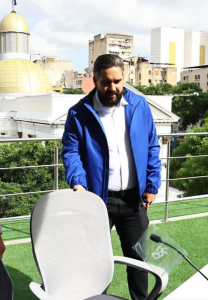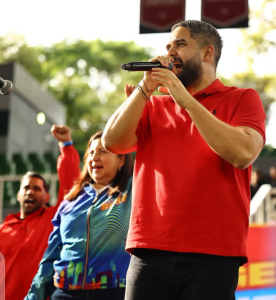Nicolás Maduro Biography: Age, Family, Education, Career & Achievement
Today let talk Nicolás Maduro Biography: Nicolás Maduro is a Venezuelan politician, trade unionist, and former bus driver who became the President of Venezuela in 2013, following the death of Hugo Chávez. Known for his strong socialist stance, controversial leadership, and strained relationship with Western powers, Maduro has become one of the most polarizing political figures in Latin America.
This in-depth biography explores Maduro’s early life, rise in politics, presidency, economic policies, international relations, allegations of dictatorship, and more.
Nicolás Maduro Biography
Nicolás Maduro Early Life and Background
Nicolás Maduro was born on November 23, 1962, in Caracas, the capital city of Venezuela. He was raised in a working-class family. His father, Nicolás Maduro García, was a prominent union leader, which influenced Maduro’s early ideological leanings.
As a young man, Maduro was heavily involved in leftist politics and labor movements. He attended Liceo José Ávalos High School, but did not obtain a university degree. He later received political training in Cuba, a close ally of Venezuela.
His early career included working as a bus driver for the Caracas Metro, and he later rose to become a trade union leader in the transportation sector.
Nicolás Maduro Political Career Beginnings
Maduro began his political journey in the 1990s as a founding member of the Movement for the Fifth Republic (MVR), a political party established by Hugo Chávez.
Key political milestones:
1998: Elected to the National Constituent Assembly.
2000: Elected to the National Assembly of Venezuela, later becoming its Speaker.
2006-2013: Appointed Minister of Foreign Affairs under President Hugo Chávez.
2012: Became Vice President of Venezuela, handpicked by Chávez.
Maduro was known for his loyalty to Chávez and played a significant role in expanding Venezuela’s ties with Cuba, Iran, China, and Russia during his time as foreign minister.

Nicolás Maduro Rise to Presidency
On December 8, 2012, President Hugo Chávez announced that if he died from his cancer, Nicolás Maduro should be his successor.
When Chávez passed away on March 5, 2013, Maduro became interim president and later won the presidential election on April 14, 2013, with just over 50% of the vote, narrowly defeating opposition leader Henrique Capriles.
Nicolás Maduro Presidency (2013–Present)
Maduro’s presidency has been marked by significant economic challenges, social unrest, international isolation, and accusations of authoritarianism.
Key Highlights of His Presidency:
Economic Crisis
Under Maduro’s rule, Venezuela plunged into hyperinflation, food and medicine shortages, and a severe recession. The country’s economy, which was heavily reliant on oil exports, suffered from: Global oil price crashes., U.S. and international sanctions. Poor economic management and corruption.
The Bolívar currency lost over 99% of its value, and more than 7 million Venezuelans fled the country due to poverty and lack of basic services.
Political Repression and Controversies
Maduro has faced widespread criticism for: Suppressing dissent. Arresting political opponents. Censoring the media. Dismantling democratic institutions.
In 2017, he created the Constituent Assembly, viewed by critics as a body to undermine the opposition-controlled National Assembly.
2018 Controversial Re-election
In May 2018, Maduro was re-elected in a widely disputed election, boycotted by most of the opposition and condemned by over 50 countries, including the U.S., Canada, and the EU.
This led to the Venezuelan presidential crisis in 2019, when Juan Guaidó, leader of the National Assembly, declared himself interim president, gaining recognition from multiple governments. Maduro, however, retained control of state institutions and the military.
Nicolás Maduro Foreign Relations
Maduro maintains strong ties with countries like:
Cuba, Russia, Iran, Turkey, China
He has accused the U.S. and its allies of imperialist aggression and plotting coups.
The U.S. imposed heavy sanctions on Maduro’s government, including oil exports, officials’ assets, and international financial access.

FNicolás Maduro amily and Personal Life
Nicolás Maduro is married to Cilia Flores, a prominent Venezuelan politician and former Attorney General. She has also served in the National Assembly and is considered one of Maduro’s closest political advisors.
Maduro does not have any biological children with Cilia but is the stepfather to her children from a previous marriage.
Nicolás Maduro Beliefs and Ideology
Maduro is a staunch socialist and claims to continue Hugo Chávez’s Bolivarian Revolution. He supports:
State control of major industries
Free healthcare and education
Anti-imperialist foreign policies
However, critics argue that under the guise of socialism, his government has become increasingly dictatorial and corrupt.
Nicolás Maduro Controversies and Criticism
Maduro has been widely condemned both domestically and internationally for: Authoritarian rule, Human rights violations, Electoral fraud, Mismanagement of the economy, Corruption and drug trafficking allegations
The International Criminal Court (ICC) has opened investigations into alleged crimes against humanity committed under his government.
Nicolás Maduro Net Worth (Estimated)
While official figures are unavailable, Nicolás Maduro’s net worth is estimated by some watchdogs to be around $2 million – $5 million USD. There are allegations of hidden wealth linked to corruption and illicit deals, though nothing has been publicly confirmed.
Frequently Asked Questions (FAQ)
Who is Nicolás Maduro?
Nicolás Maduro is the President of Venezuela, former Vice President, and a longtime political ally of Hugo Chávez. He took office in 2013 after Chávez’s death.
How old is Nicolás Maduro?
He was born on November 23, 1962, and is 62 years old as of 2025.
Was Nicolás Maduro a bus driver?
Yes. Before becoming a politician, Maduro worked as a bus driver for Caracas Metro. His union activities helped launch his political career.
Is Maduro still the president of Venezuela?
Who is Nicolás Maduro?
Nicolás Maduro is the President of Venezuela, former Vice President, and a longtime political ally of Hugo Chávez. He took office in 2013 after Chávez’s death.
How old is Nicolás Maduro?
He was born on November 23, 1962, and is 62 years old as of 2025.
Was Nicolás Maduro a bus driver?
Yes. Before becoming a politician, Maduro worked as a bus driver for Caracas Metro. His union activities helped launch his political career.
What is Nicolás Maduro’s ideology?
He is a socialist and proponent of Chavismo, a political ideology based on the policies and leadership of Hugo Chávez.
Is Maduro recognized internationally?
Maduro is recognized by countries like Russia, China, Iran, and Turkey, but not by the United States, European Union, and several Latin American nations who back Juan Guaidó as the legitimate leader.
Conclusion
Nicolás Maduro’s story is one of radical transformation—from a bus driver and unionist to one of the most powerful and controversial leaders in Latin America. His presidency has been marked by economic decline, political unrest, and accusations of authoritarianism.
Supporters see him as a defender of socialism and resistance against Western interference, while critics label him a dictator responsible for Venezuela’s humanitarian crisis.
Whether loved or loathed, Maduro’s impact on Venezuela and on global geopolitics cannot be ignored.
